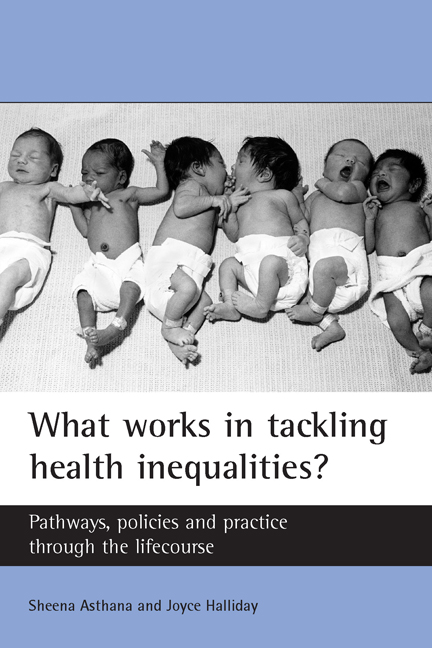Book contents
- Frontmatter
- Dedication
- Contents
- List of tables, boxes and figure
- Acknowledgements
- List of abbreviations
- one Introduction
- Part 1 The research and policy context of health inequalities
- Part 2 Health inequalities pathways, policies and practice through the lifecourse
- Part 3 Tackling health inequalities: developing an evidence base for public health
- Index
Part 2 - Health inequalities pathways, policies and practice through the lifecourse
Published online by Cambridge University Press: 14 January 2022
- Frontmatter
- Dedication
- Contents
- List of tables, boxes and figure
- Acknowledgements
- List of abbreviations
- one Introduction
- Part 1 The research and policy context of health inequalities
- Part 2 Health inequalities pathways, policies and practice through the lifecourse
- Part 3 Tackling health inequalities: developing an evidence base for public health
- Index
Summary
In this main part of the book, we examine the pathways, policies and practice of health inequalities throughout the lifecourse. As observed in Chapter One, this structure reflects the theoretical orientation of health inequalities research in recent years. It allows us to explore the links between social determinants of health, mediating biological factors and health outcomes and to assess the role of interventions targeting these linkages. It is also broad enough to accommodate more standard approaches to public health (which focus on the role of different risk factors, population groups, policy sectors and health outcomes).
Four critical periods are examined in this section (early life, childhood and youth, adulthood and older age). For each period, chapters are respectively devoted to evidence of health inequalities and the pathways that give rise to health inequalities and to evidence of ‘what works’ in tackling such health inequalities. Chapter Four, for example, begins by considering research evidence that links early life factors (during pregnancy, infancy and early childhood) to adverse health outcomes. It then discusses the significance of early life experiences to health inequalities. By linking epidemiological evidence that highlights key risk factors to evidence of the social context of risk, it notes that it is theoretically possible to identify the kinds of policy interventions that could improve the healthy development of young children from disadvantaged backgrounds. Thus, on the basis of the evidence provided, smoking cessation, nutrition (with some qualifications), parenting education and early years education and care emerge as key areas for intervention. Chapter Five focuses on these health behaviours. For each area, research evidence of ‘what works’ is carefully assessed, the limitations of the existing evidence base examined and the recent development of key policy initiatives described. In what is to become an important theme of the book, the tensions that emerge in translating policy recommendations into actual policy mechanisms are explored and the point made that outcomes vary according to a wide range of factors such as content, process, context and the characteristics of the intervention group. The chapter nevertheless concludes by suggesting that it is possible to identify effective interventions and that these tend to be multifaceted.
- Type
- Chapter
- Information
- What Works in Tackling Health Inequalities?Pathways, Policies and Practice through the Lifecourse, pp. 107 - 110Publisher: Bristol University PressPrint publication year: 2006



